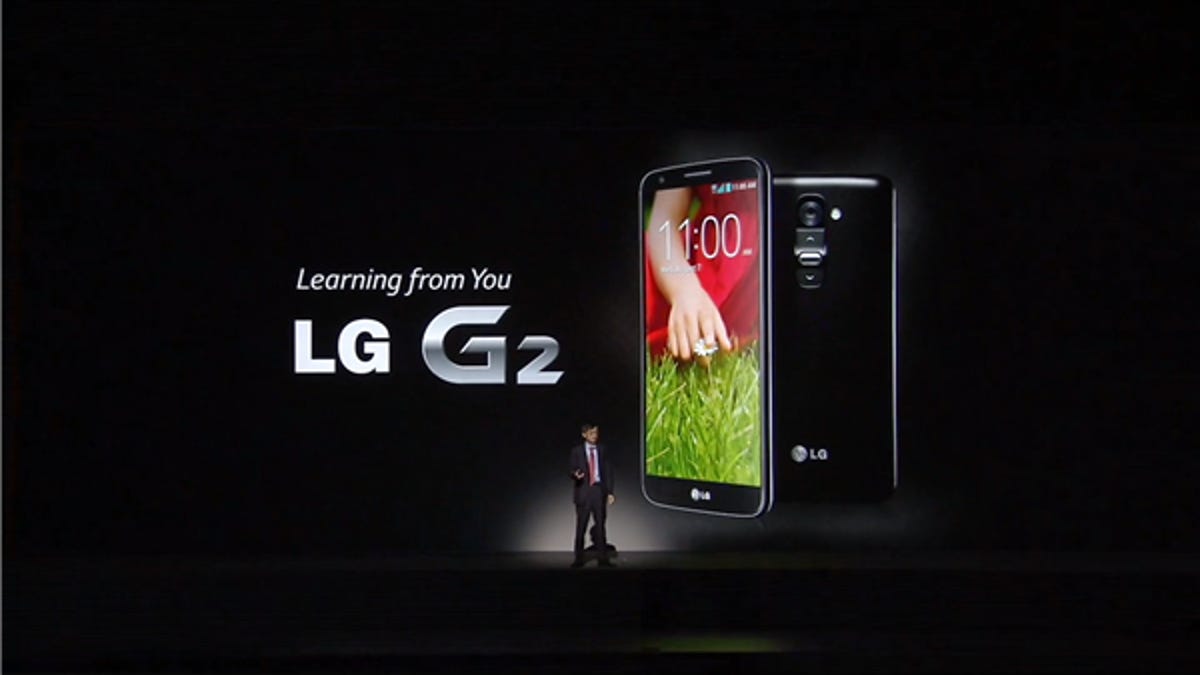With G2, LG gets its mini-Galaxy S4 moment
LG has made solid progress in the smartphone market, but still lacks a breakout hit. The company hopes the G2 will garner some much-needed hype.

Will the
LG certainly hopes so and has banked heavily on its latest super smartphone to finally give the company a global blockbuster it is so desperately seeking. The Korean electronics giant has been steadily building up the hype for the device, releasing videos, promoting the event through digital ads (including on this site), and making it known that its next flagship smartphone is just around the corner.
The event today -- which thankfully omitted the overly dramatic theatrics of Samsung's GS4 debut, but did feature a curious spotlight on a single Vienna Boys' choir singer at the end -- was designed to convey the impression that the G2 belongs among the big boys in the smartphone industry. The company positioned it as the ideal phone designed for the user.
"Technology without empathy can no longer be considered innovation," LG mobile CEO Jong-Seok Park said during the event on Wednesday. "Innovation for the sake of innovation is old school."
LG, which has long lived in the shadow of larger rival Samsung Electronics, desperately wants its G2 to be uttered in the same breath as the GS4 or Apple's
Such is the dilemma for every smartphone vendor not named Apple or Samsung. While the two leaders benefit from a certain level of built-in hype, the other players continue to clamor for the constantly shifting attention of the consumer.
For many, the quest for smartphone relevancy has resulted in continued losses, but it's here that LG differs. In the second quarter, the company saw a 34.5 percent increase in revenue as it swung back into profitability. LG shipped a record 12 million smartphones in the period.
LG also saw its second-quarter market share rise to 5.1 percent, from 3.7 percent a year ago -- good enough to rank it as No. 3 in the world, according to IDC.
LG is looking for a fresh start with the G2. The company said in July that it was dropping the Optimus name, instead relying on the simpler G2 as the follow-up to its flagship
LG is the latest to hop aboard the trend of offering a single flagship device across multiple carrier partners, a strategy that has been successfully employed by Samsung, Apple, and HTC.
Broad distribution, of course, won't guarantee sales. If you're not Apple or Samsung, you need to try harder to get noticed. The
With the G2, LG crammed in an impressive amount of high-end specifications, including a Qualcomm 2.26GHz quad-core processor, 13MP optical image stabilization camera, a 3,000mAh battery supposedly able to last 1.2 days, and a large 5.2-inch high-definition IPS display.
The G2, however, uses a cheaper-feeling plastic construction at a time when most of its competitors have moved to metal.
Aside from improved specs, the marked difference is LG's decision to place the power and volume buttons on the back of the device, just under the center rear camera. It's a controversial choice that LG said came about from researching how people hold their phones. Still, it's unclear whether consumers will embrace this subtle, but radical, shift.
"It's different, which is saying something, when so many devices, especially the ones running Android, all seem to look the same," said Ovum analyst Jan Dawson. "But it's risky in a flagship."
LG needed to do something to stand out. The company's dilemma continues to be its reputation as a serviceable -- but unsexy -- brand.
"The huge difference between Samsung and LG in the U.S. is that when you talk to normal people about Samsung, they'll mention the Galaxy brand, but when you talk to them about LG they'll talk about TVs and refrigerators," Dawson said.
The company hit its high point a few years ago in the mobile business by supplying slick basic phones -- noteworthy for phone brands such as the "Chocolate" -- but was slow to jump on to the Android bandwagon when it took off.
Samsung had been similarly slow, but made up for it with a slew of products and the might of its massive marketing engine. LG doesn't have the luxury of throwing truckloads of marketing dollars to promote a device and has had to get by on the strength of its phones and more subtle promotional efforts.
LG at least sounds like it is taking its flagship aspirations seriously. The company is mimicking the strategy of other vendors and focusing all of its resources behind the G2.
"This is it for us for 2013," LG representative Ken Hong told CNET.
Hong declined to talk about how much it would spend on the G2, but acknowledged that LG wouldn't be able to spend at the same level as Samsung. Instead, LG will focus on digital and social marketing and attempt to build a grassroots movement to raise awareness for the phone.
"We don't worry about what we can't do," he said. "We worry about what we can do."
LG needs to go through the same transformation that Samsung has gone through over the past few years. But such a process doesn't come without great cost. Hong said the smartphone battle isn't a sprint, and the ones that will survive are the ones with a sustainable long-term strategy.
The company is hoping the G2 debut, which in some ways mimicked Samsung's launch events, will drum up a little hype as consumers opt to look for new phones in the critical back-to-school and holiday shopping seasons.
"We're happy we're even in the top three," he said. "It's such a competitive industry, to be even in the same list with some of these other brands just shows we're still relevant."
Shara Tibken contributed to this story.

